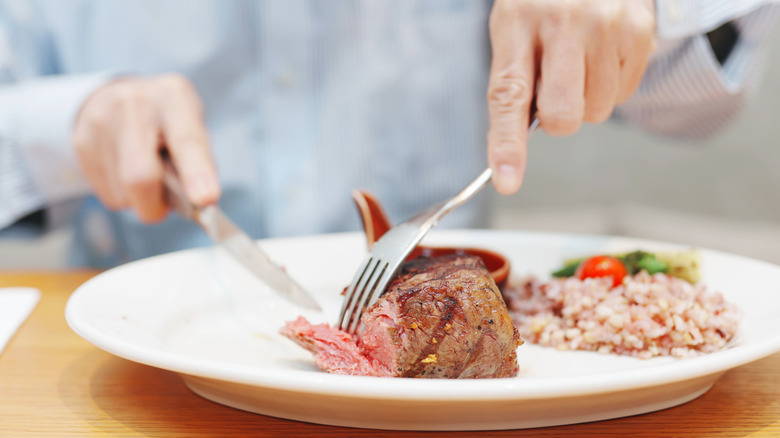What Happens To Your Body When You Start Eating Meat Again?
Many people choose to remove meat from their diets for various reasons. While some are perfectly happy being vegan or vegetarian, others struggle with this lifestyle. Some people may have a hard time finding meat alternatives that they enjoy eating while others might experience health issues when they remove this protein from their diets. Whatever the case may be, it is not uncommon for someone to reintroduce meat into their diet after a long period of eating vegan or vegetarian.
According to PopSugar, meat takes longer to break down in the body than many plant-based foods. If your digestive system isn't used to meat, you may feel bloated or constipated after you eat it. You can offset some of these issues by eating small amounts of meat at a time and taking a digestive enzyme. "It takes quite a few enzymes to break down protein, so it's a good idea to start slowly with only 1 ounce (1 inch by 1 inch by 1 inch) with 2 cups of steamed vegetables and a papaya enzyme, and if you are into digestive enzymes that contain protease, lipase, and amylase, take one with your meal," said Mariana Daniela Torchia, MPH, RD, PhD. You can buy digestive enzyme supplements or eat fruits that work as natural digestive enzymes like papaya.
Other reactions you may have when eating meat
In addition to bloating and constipation, you may also experience breakouts and heartburn when you start eating meat again (via PopSugar). On the plus side, you may feel full more quickly and experience fewer blood sugar spikes. If your meatless diet was high in carbs, adding in more satisfying protein may reduce your sugar cravings as well. If you have experienced low levels of iron or vitamin B12, which is common in vegans and vegetarians, those will likely improve.
If you're thinking of reintroducing meat into your diet, it is important to start slow. You may also want to get your meat from restaurants that you know will prepare the food correctly (via Mindbodygreen). You'll also want to avoid raw or undercooked meat, which can be even harder for your body to digest. Add small portions of meat to your food and gradually ramp up the amount as you get more used to it. If you're having issues eating meat again, it's best to speak with a dietician or nutritionist about the best way to make the transition.


